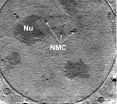(Press-News.org) LOS ANGELES (Nov. 19, 2010) – In a study of more than 4,500 children, researchers found those with higher waist circumferences had significantly higher pulse pressures, which is known to increase the risk of heart-related disorders, according to an abstract presented today at the American Society of Nephrology's Renal Week conference in Denver.
Gangadarshni Chandramohan, MD, a researcher at Los Angeles Biomedical Research Institute at Harbor-UCLA Medical Center (LA BioMed) and the lead author of the abstract, said the research team studied data from 4,667 children aged 6 to 17 years who were part of the Third National Health and Nutrition Examination Survey. The study's authors advocate for measuring waist circumference – rather than body mass index – during routine physical examinations to identify children who are at risk for heart disease.
"We found the children's body mass didn't correlate to higher pulse pressures, but their waist circumference did," Dr. Chandramohan said. "This study suggests pediatricians add waist measurements to their routine screening of children to help determine the risk of heart-related disorders. Measuring waist circumference is a much simpler, more cost-effective and a more valid method of screening for the risk of heart-related disorders than the current practice of determining a child's body mass."
Previous studies have found a high pulse pressure – the difference between the systolic and diastolic blood pressure readings – increases a patient's risk of heart-related disorders – as does high blood pressure.
"It is crucial that new indices for measuring various physiologic parameters such as obesity and associated cardiovascular risk factors be determined using valid, minimally invasive and cost-effective tools to help patients avoid long-term health concerns," said Dr. Chandramohan.
INFORMATION:
Study co-authors included: Kamyar Kalantar-Zadeh, MD, PhD, LA BioMed; Sheena Cecille Marie Go, Harbor-UCLA Medical Center, and Keith Norris, MD, and Dulcie Kermah, both from Charles Drew University School of Medicine.
Dr. Chandramohan presented the abstract at the American Society of Nephrology's Renal Week, which is billed as the world's premier meeting in nephrology where nearly 14,000 participants exchange knowledge and work to improve kidney health. The American Society of Nephrology is the largest organization dedicated to leading the fight against kidney disease. Its more than 11,000 members include physicians, scientists and other health professionals, all committed to improving kidney care by advancing scientific knowledge and clinical practice.
About LA BioMed
Founded in 1952, LA BioMed is one of the country's leading nonprofit independent biomedical research institutes. It has more than 150 principal researchers conducting studies into improved treatments and cures for cancer, inherited diseases, infectious diseases, illnesses caused by environmental factors and more. It also educates young scientists and provides community services, including immunization and childhood nutrition programs. LA BioMed is academically affiliated with the David Geffen School of Medicine at UCLA and located on the campus of Harbor-UCLA Medical Center. For more information, please visit www.LABioMed.org
LA BioMed research finds kids with larger waist sizes are more likely to have cardiac risk factors
Abstract presented at American Society of Nephrology's Renal Week
2010-11-20
ELSE PRESS RELEASES FROM THIS DATE:
COPD could be a problem with autoimmunity
2010-11-20
Moderate to severe chronic obstructive pulmonary disease (COPD) may be an auto-immunity problem, according to researchers in Spain, who studied the presence of auto-antibodies in patients with COPD and compared them to levels of control subjects. They found that a significant number of patients with COPD had significant levels of auto-antibodies circulating in their blood, about 5 to 10 times the level in controls.
The findings were published online ahead of the print edition of the American Thoracic Society's American Journal of Respiratory and Critical Care Medicine.
"We ...
Report: For every 1 homeless person in Canada, another 23 live in inadequate housing
2010-11-20
TORONTO, Nov. 19, 2010--For every one person in Canada who is homeless, another 23 live in unsafe, crowded or unaffordable housing, meaning the country's housing crisis is even worse than previously thought, according to Dr. Stephen Hwang of St. Michael's Hospital in Toronto.
Those "vulnerably housed" people have the same severe health problems and dangers of assault as homeless people, said Hwang, principal investigator of a new report on housing and health issues in Vancouver, Toronto and Ottawa.
"The key point is that Canada needs a national housing strategy," ...
Eating a variety of fruit cuts lung cancer risk
2010-11-20
Eating five portions of fruit and vegetables per day is one of the means that experts most frequently recommend for preventing cancer. Now, the European EPIC study carried out by researchers from 10 countries has shown that, in the case of lung cancer, the important thing is not just the quantity but also the variety of fruit consumed, which can reduce the risk by up to 23%.
"This research looks more deeply into the relationship between diet and lung cancer", María José Sánchez Pérez, co-author of the study and director of the Granada Cancer Registry at the Andalusian ...
Special section on ecological distribution conflicts in the journal Ecological Economics
2010-11-20
Researchers from Institute of Environmental Science and Technology (ICTA), at Universitat Autònoma de Barcelona (UAB), and other universities have published a special section in the journal Ecological Economics that analyzes the link between ecological economics and political ecology. This issue stems from the institute's research on impacts and resistance at the "commodity frontiers", where the extraction of natural resources and the disposal of toxic wastes produce a range of economic, environmental, cultural and social conflicts.
The special issue, titled Social Metabolism, ...
Online map of maternal health to inform world leaders
2010-11-20
Researchers from the University of Southampton have helped construct an online interactive world map which gives stark facts and figures about the health of women during pregnancy, childbirth and following the birth of their child.
Social scientists Professor Zoë Matthews and Dr Sarah Neal are working in collaboration with the White Ribbon Alliance for Safe Motherhood and the University of Aberdeen on a joint project worth in excess of £160,000 called 'The Atlas of Birth', which also includes a book, short film and flyers.
"We are using data from the United Nations ...
New microscope reveals ultrastructure of cells
2010-11-20
For the first time, there is no need to chemically fix, stain or cut cells in order to study them. Instead, whole living cells are fast-frozen and studied in their natural environment. The new method delivers an immediate 3-D image, thereby closing a gap between conventional microscopic techniques.
The new microscope delivers a high-resolution 3-D image of the entire cell in one step. This is an advantage over electron microscopy, in which a 3-D image is assembled out of many thin sections. This can take up to weeks for just one cell. Also, the cell need not be labelled ...
Gene links to anorexia found by Children's Hospital of Philadelphia researchers
2010-11-20
Scientists at The Children's Hospital of Philadelphia have identified both common and rare gene variants associated with the eating disorder anorexia nervosa. In the largest genetic study of this psychiatric disorder, the researchers found intriguing clues to genes they are subjecting to further investigation, including genes active in neuronal signaling and in shaping interconnections among brain cells.
Anorexia nervosa (AN) affects an estimated 9 in 1000 women in the United States. Patients have food refusal, weight loss, an irrational fear of weight gain even when ...
Designing more effective anti-HIV antibodies
2010-11-20
Boston, Mass. – Although people infected with HIV produce many antibodies against the protein encapsulating the virus, most of these antibodies are strangely ineffective at fighting the disease. A new study suggests why some of the most common of these antibodies don't work: they target the protein in a form it takes after the virus has already invaded the cell, when it's too late, report researchers at Children's Hospital Boston and their colleagues.
The findings, published online Nov. 14 in the journal Nature Structural & Molecular Biology, refocus attention on the ...
Professor Zvi Ram presents phase III recurrent glioblastoma survival and quality of life data from the first pivotal study of the NovoTTF-100A at 15th Annual Society for Neuro-Oncology Scientific Meet
2010-11-20
MONTREAL, CANADA - November 19, 2010 - Data presented today from a pivotal, phase III randomized clinical trial for patients with recurrent glioblastoma tumors suggest that Tumor Treating Fields (TTF) therapy may increase median survival time and improve quality of life scores compared to best standard of care chemotherapy. Professor Zvi Ram, chairman of the Department of Neurosurgery at Tel-Aviv Sourasky Medical Center, presented the data at the Society for Neuro-Oncology (SNO) Annual Scientific Meeting.
Physicians delivered the investigational TTF therapy to patients ...
Childhood obesity linked to increased risk of adult cardiovascular and metabolic disorders
2010-11-20
New Rochelle, NY, November 19, 2010—Mounting evidence linking childhood obesity to an increasing risk of obesity, heart disease, type 2 diabetes, and other cardiovascular and metabolic disorders in adulthood is clearly presented in a comprehensive review article in the current issue of Childhood Obesity, published by Mary Ann Liebert, Inc. The article is available free online.
Authors Megan Moriarty-Kelsey, MD and Stephen Daniels, MD, PhD, Department of Pediatrics, University of Colorado School of Medicine, caution that the rising prevalence of obesity in children will ...
LAST 30 PRESS RELEASES:
National poll finds gaps in community preparedness for teen cardiac emergencies
One strategy to block both drug-resistant bacteria and influenza: new broad-spectrum infection prevention approach validated
Survey: 3 in 4 skip physical therapy homework, stunting progress
College students who spend hours on social media are more likely to be lonely – national US study
Evidence behind intermittent fasting for weight loss fails to match hype
How AI tools like DeepSeek are transforming emotional and mental health care of Chinese youth
Study finds link between sugary drinks and anxiety in young people
Scientists show how to predict world’s deadly scorpion hotspots
ASU researchers to lead AAAS panel on water insecurity in the United States
ASU professor Anne Stone to present at AAAS Conference in Phoenix on ancient origins of modern disease
Proposals for exploring viruses and skin as the next experimental quantum frontiers share US$30,000 science award
ASU researchers showcase scalable tech solutions for older adults living alone with cognitive decline at AAAS 2026
Scientists identify smooth regional trends in fruit fly survival strategies
Antipathy toward snakes? Your parents likely talked you into that at an early age
Sylvester Cancer Tip Sheet for Feb. 2026
Online exposure to medical misinformation concentrated among older adults
Telehealth improves access to genetic services for adult survivors of childhood cancers
Outdated mortality benchmarks risk missing early signs of famine and delay recognizing mass starvation
Newly discovered bacterium converts carbon dioxide into chemicals using electricity
Flipping and reversing mini-proteins could improve disease treatment
Scientists reveal major hidden source of atmospheric nitrogen pollution in fragile lake basin
Biochar emerges as a powerful tool for soil carbon neutrality and climate mitigation
Tiny cell messengers show big promise for safer protein and gene delivery
AMS releases statement regarding the decision to rescind EPA’s 2009 Endangerment Finding
Parents’ alcohol and drug use influences their children’s consumption, research shows
Modular assembly of chiral nitrogen-bridged rings achieved by palladium-catalyzed diastereoselective and enantioselective cascade cyclization reactions
Promoting civic engagement
AMS Science Preview: Hurricane slowdown, school snow days
Deforestation in the Amazon raises the surface temperature by 3 °C during the dry season
Model more accurately maps the impact of frost on corn crops
[Press-News.org] LA BioMed research finds kids with larger waist sizes are more likely to have cardiac risk factorsAbstract presented at American Society of Nephrology's Renal Week



